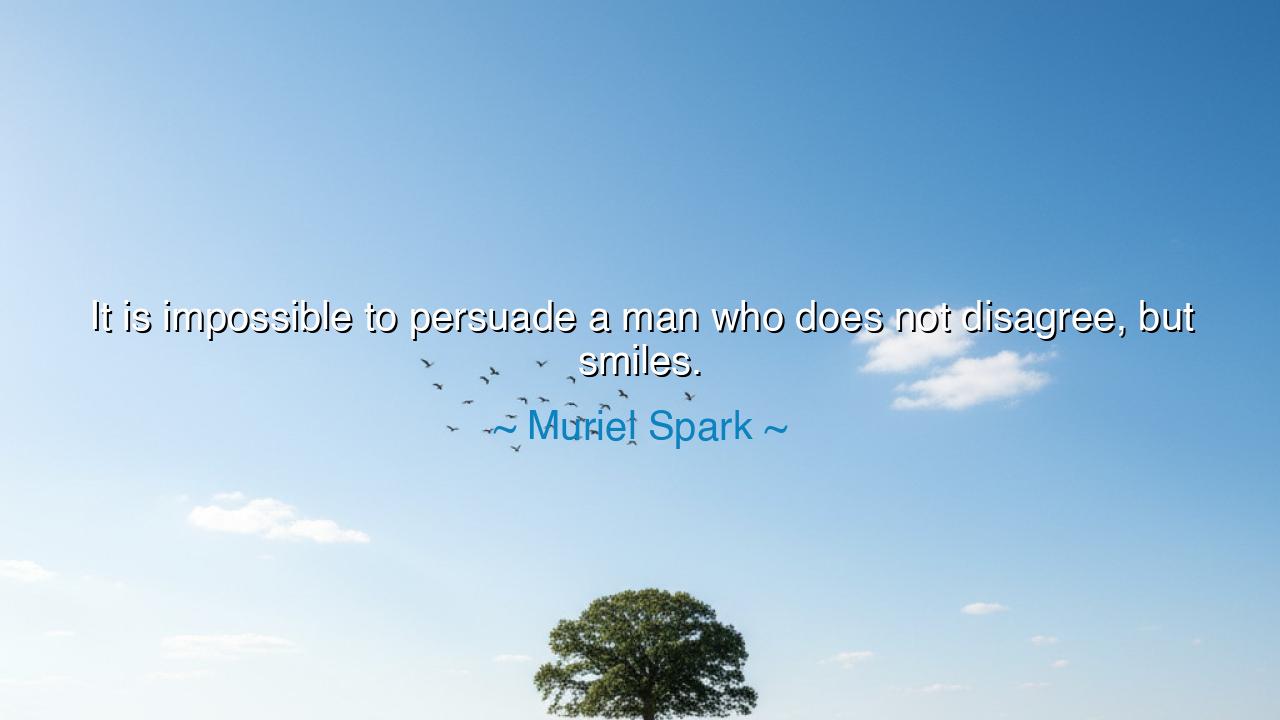
It is impossible to persuade a man who does not disagree, but






Hear the words of Muriel Spark, who spoke with the keen insight of one who knew the subtleties of human nature: “It is impossible to persuade a man who does not disagree, but smiles.” In this saying lies a mystery of the heart—the power of silence clothed in courtesy, the armor of a smile that neither yields nor resists. For persuasion requires a struggle, the clash of words against words, ideas against ideas. But when a man hides his thoughts behind a smile, he becomes unassailable, neither agreeing nor contesting, and thus cannot be moved.
The ancients knew well the art of debate. Socrates, with questions like arrows, pierced the armor of many men by forcing them into open disagreement. He could persuade because he drew the hidden thoughts into light, where they could be tested. But what of the man who offers only a gentle smile, who cloaks his true mind in pleasantness? He is like a fortress with no gates, walls smooth and impenetrable, leaving no opening for persuasion. Thus Spark names a truth older than philosophy itself: you cannot move what refuses to take a stand.
History offers us many examples. Consider the courts of medieval diplomacy, where kings and ambassadors bartered for power. There were men who, when pressed, would not voice dissent but only smiled and nodded. These were the most dangerous, for their silence concealed their true intent. When the Treaty of Troyes was signed in France in 1420, many nobles outwardly appeared agreeable, hiding rebellion behind courtesy. Their smiles could not be persuaded, for they never showed their hearts, and soon after, France rose again in defiance. The lesson is clear: it is not the loud opponent who is hardest to sway, but the quiet smile that hides dissent.
Even in personal life this truth holds. A teacher may lecture, a parent may plead, a leader may argue—but if the listener offers only a polite smile, without word of agreement or resistance, no persuasion is possible. For persuasion requires friction; it requires the fire born of opposition. The man who only smiles refuses the fire, and thus remains untouched. His silence may be courtesy, or it may be cunning, but it is always a wall against the hand that would shape him.
The meaning, then, is twofold. First, it warns the persuader: do not waste all your strength on the smile that hides the heart, for words cannot pierce what is never revealed. Second, it teaches the listener: if you hide behind smiles, you also deny yourself growth. For to never disagree is to never engage, and to never engage is to remain unchanged. The smile may shield you from conflict, but it also shields you from wisdom.
The lesson is clear: honesty is the gateway of persuasion. To the one who seeks to teach, demand clarity—do not accept a mask of politeness in place of true thought. To the one who listens, dare to speak, whether in agreement or dissent, for only by opening the heart can it be shaped. The smile may win you peace in the moment, but it will win you no transformation.
Practical actions are these: when engaged in dialogue, do not hide behind silence and pleasantness if you truly hold another view. Speak with respect, but speak with truth, for this is the only soil where wisdom may grow. And if you find yourself facing a smile that offers no opposition, know that persuasion cannot be forced; seek instead patience, relationship, or another time when honesty will emerge.
Thus let Muriel Spark’s words be carried forward: “It is impossible to persuade a man who does not disagree, but smiles.” For persuasion lives in the open air of honest conflict, not in the closed chambers of hidden thoughts. The smile may seem peace, but it is often the stillness of stone—and stone cannot be persuaded. Only the heart that dares to wrestle with truth can be changed.






AAdministratorAdministrator
Welcome, honored guests. Please leave a comment, we will respond soon